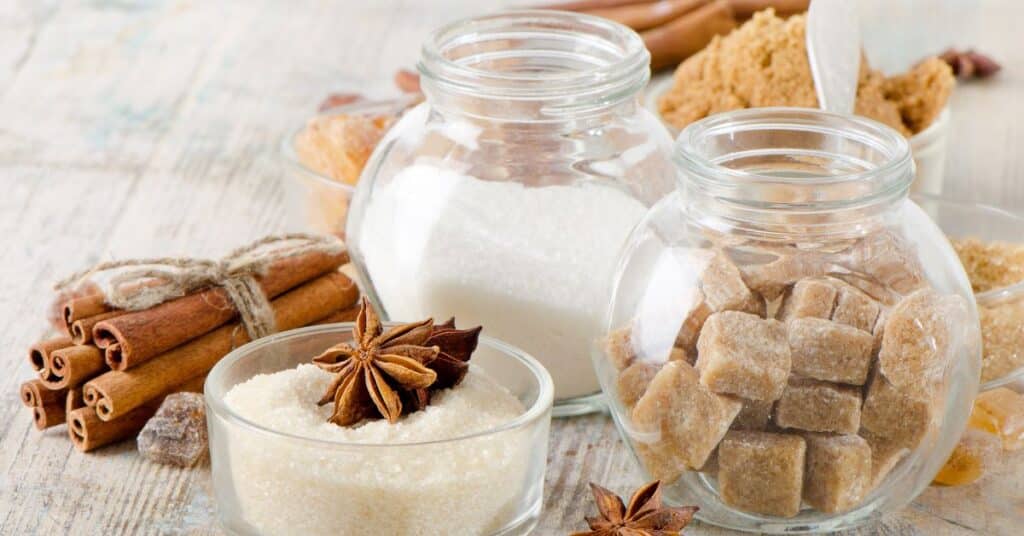

Can you still have sugar on a whole food, plant-based diet? Yes…and no. Confused?
Let’s break this down. When it comes to a whole food, plant-based lifestyle, refined sugars, like high fructose corn syrup and white sugar, are off the table. These are heavily processed and devoid of nutrients and fiber (which we need to regular blood sugar levels).
Okay, so what can you use to sweeten your food? If you’re looking to go the more natural and less refined route, brown rice syrup, maple syrup, and raw local honey are good options though some whole food, plant-based experts do note they’re not technically whole foods (and honey isn’t vegan).
Hoping to stay 100% whole food, plant-based? Go for whole food sources of sugar like homemade date paste or syrup, dried fruits, and fruit purees like unsweetened applesauce, and mashed bananas. This is what we use to sweeten our food at MamaSezz.
Is your sweet tooth throwing a monkey wrench in your whole food, plant-based lifestyle? Refined and added sugar consumption in the United States is off the charts and not to be a Debbie Downer, but the health consequences are serious, from chronic inflammation and heart disease to obesity and cancer. But it’s not all doom and gloom! You can indulge your sweet tooth and sustain a whole food, plant-based lifestyle. How? By switching from refined sugars to natural and whole food sweeteners.
But first, here’s the skinny on the difference between the two.
Refined sugar typically comes from sugar cane or sugar beets. Wait a minute…that sounds pretty darn plant-based doesn’t it? Well, not so fast. To make these refined sugars, everything goes through an extraction and purification process, and the fiber and nutrients of the sugar cane or sugar beet are lost. Fiber stabilizes blood glucose levels by slowing the rate of absorption of sugar into your bloodstream.
This lack of fiber is why your energy spikes and dips when you drink a soda but not so much when you eat a whole food source of sugar, like a banana (which has 14 grams of natural sugar, by the way!). The fiber in the banana regulates the way your body processes this sugar and lets you use the energy in a more sustainable way. Not to mention bananas, and other whole foods, are packed with nutrients to help fuel your body and reduce your risk for many serious chronic diseases that refined sugar can bring on, like…
Refined sugar is inflammatory and associated with the risk of developing health issues, like obesity, type 2 diabetes, heart disease, and certain cancers like breast, prostate, uterine, colorectal and pancreatic. Plus, refined sugars are physically addictive as heck!
Can’t shake sugar? Learn how to overcome your refined sugar addiction here.
Word to the wise – read nutrition labels! The food industry has many names for refined sugar and they’re not always obvious. Here are just a few of the sneaky ingredients to look out for (and avoid) when reading nutrition labels:
You can have your (whole food, plant-based) cake and eat it, too. Don’t worry — the solution isn’t eating bananas instead of cookies. But you may be using bananas to sweeten those cookies…trust us, it’s easy and delicious. More on that in a minute.
In the whole food, plant-based world, there are a few schools of thought regarding which natural sweeteners are on the table. We don’t like to dole out rules and regulations. We just want to give you the best information we’ve got to help you make the best choice for your health and lifestyle.
These include:
If you go this route: make sure to up your fiber intake by adding some ground up flax seed (which can be used as an egg substitute when mixed with water), fruits, or whole grains (not refined grains or flour) to the mix.
These include:
If you go this route: make your own date syrup by blending soaked dates with water until you’ve reached a smooth, syrupy consistency. Dates (like many dried fruits) are loaded with both fiber and natural sugar (fructose) and have a rich, molasses-like taste that will give your dessert a unique flavor. Try making syrup from raisins and prunes for a more distinctive flavor. Better yet, use those 14 grams of sugar and mush up a ripe banana that acts not only as a binder (egg replacer) but as a sweetener, too — making it perfect for tasty baked goods!
Once you’re off sugar, you will find that you don’t even want it. How is that possible? When you ditch sugar, your taste buds readjust in as little as two weeks, often making refined sugar taste too sweet to your more sensitive taste buds. This taste bud reset makes staying off sugar that much easier and makes whole plant-based foods that much tastier.
This article was reprinted with permission from MamaSezz.
Copyright 2024 Center for Nutrition Studies. All rights reserved.